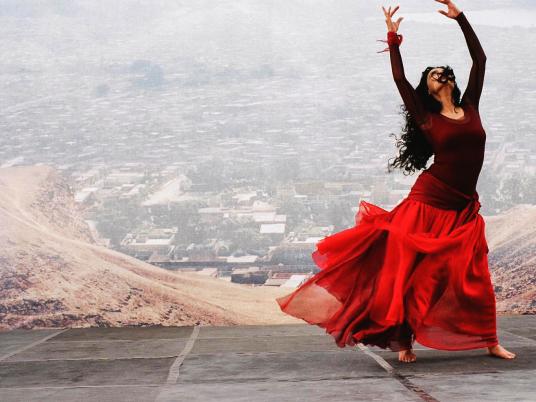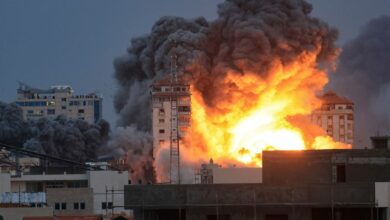
Although filmmaker Jocelyne Saab was born and raised and is based in Beirut, her filmmaking career has also centered on Cairo. She shot one documentary in the city in 1979, a second in 1986 and a third on Arab dancing in 1989. And because it had always been “a dream of youth” to make cinema in the “city of cinema,” as she told Egypt Independent, in 1998 she began work on the script of her first Cairene feature.
“Dunia” was released in 2005 and immediately censored.
Since then, it has been officially screened twice in Egypt. The first was in June 2011 at the Cervantes Institute. The second was last weekend, with the British Council screening the film for the third Cairo Mediterranean Literary Festival.
The Lebanese filmmaker attended the most recent screening.
Saab wore a voluminous white skirt and carried a bicycle basket she was using as her backpack. She seemed unaware that it was also a pannier. Saab is in her mid-sixties and her portfolio is scattered with documentaries, feature films, photography exhibitions and multimedia installations. She has an air of tough independence, but combined with a kind of bohemian whimsy.
The 2005 film tells the story of a young free-spirited woman, Dunia (acted by Egyptian sweetheart Hanan Tork), a dancer and student of Arabic poetry. She falls in love with her thesis supervisor, public intellectual Beshir (Mohamed Mounir), but marries her boyfriend Mamdouh (Fathy Abdel Wahab), who disapproves of her dancing.
“It tells the story of a modern Egyptian woman deciding how to live her life,” Saab summarized, “and what to be.”
One of the powerful scenes in the movie shows a clitoridectomy. However, the film is less concerned with the issue of female genital mutilation, or khittan in Arabic, Saab said, than “intellectual circumcision.”
“If you mutilate the body you mutilate the psyche. If you mutilate what is the most private thing — love and desire and pleasure — you mutilate the A, B, C of human beings," she said.
The chief mutilation is censorship. The film is set at a time when Islamist groups are calling for the literary classic “One Thousand and One Nights” to be banned as pornography.
Like the protagonist's dance training, Saab’s making of the film was a bold act of becoming: it is an “artistic film,” a leap away from the kind of documentaries that had made her name. Before them, she had been a war reporter.
These themes of artistic liberation and social pressures haunted the filming, which took seven weeks.
On-camera, Tork plays a freewheeling young poet and dancer. Off-camera she had contradictory feelings about whether to wear an Islamic head scarf, and would take hijab a year later.
When the film was released to controversy, Saab said, the actors retreated from the spotlight.
“They were afraid. I can understand why; they needed to work. I am not angry. But it is hard for a director not to have her actors. It was as though they had never done the film.”
The main points of controversy were the clitoridectomy scene, a sex scene on a bed, and the panning shots of Cairo slums (which were thought to maybe tarnish Egypt’s international reputation).
Nevertheless, the censors allowed the film to screen in Cairo cinemas for one week. When the distribution company opted for a low-key marketing campaign, Saab retaliated. “I rented a truck for selling tomatoes and chicken, and some friends made ‘Dunia’ posters to cover the truck. For three days I went from intersection to intersection, blocking the road, stopping circulation, handing out fliers. The police came, and I just went to another district.
“After doing all this work, I was convinced my film should exist,” she said.
Then, having gone to the cinema on the opening day and been told the advertised movie, “Dunia,” had been replaced with an American film, Saab suffered a stroke.
“I got sick for a while. I had to calm down. I left filmmaking and went back to photos. I couldn’t concentrate. It was very hard.”
For two years she toured the world with her film. That first year, it was nominated for the Grand Jury Prize in the drama category for world cinema at the Sundance Film Festival.
Saab said she felt vindicated by the events of 25 January 2011. “The role of the filmmaker is to go and read in the head of the people what they dare not say. The film expresses what was fought for and said with a high voice.”
She said she dreams of “Dunia” being re-released in the commercial cinemas.
Iconic singer Mohamed Mounir, Saab said, grew into the role she created for him. Like the public intellectual he plays, Beshir, Mounir has courted a public image as an experienced, wise man calling for calm and reason. “He has become an icon for the revolution, the singer of the youth,” she said. “I wish Mounir would take the film in his hand, and push it into the first row. He can do it. He is now more famous than any president going for election.”
But they have not been in touch, she said.
Saab had flown from Beirut especially for the Cairo Mediterranean Literary Festival’s screening of her film. In the end about 80 people attended, but at one point it had looked like there were going to be a lot of empty chairs. The film was notorious, but notoriety quickly fades into anonymity. Maybe “Dunia” had been forgotten.
“Is this all?” said Saab, surveying the rows of chairs facing the projector screen.
“It’s still early,” the organizer assured her. “More will come.”
“No, is this all the chairs? I think many more people will come,” she said.
Saab was playing confident, but it was a bluff. During the Egypt Independent interview she had acknowledged how one censorship controversy was quickly replaced by another. “It’s a new generation,” she said. “Things get forgotten quickly.”
But for her, she said, “Dunia” is a wound that hadn’t healed.
She told a symbolic story about the last day of shooting. It was her birthday, she said, and the lead actress presented a cake. The cake had the director’s photo printed in the icing. “Then [Tork] came with a knife and cut my head.”
“People said, ‘It’s the last day of shooting, couldn’t you have waited?’"
Apparently Tork's answer was: "The knife is too heavy for me. I have to cut her head, because I will not have the courage to live the life I lived in the film. I would like to, but society is too heavy.”
“Then Mounir said, ‘We’re going to make it softer,’” Saab continued. “He went to the place where my heart would be, though it was not drawn, and cut out a shape of the heart.”
“‘Let’s eat it,’ Mounir said. ‘The three of us.’”




